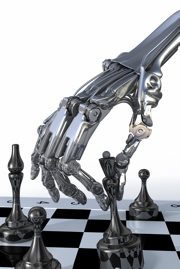A magazine where the digital world meets the real world.
On the web
- Home
- Browse by date
- Browse by topic
- Enter the maze
- Follow our blog
- Follow us on Twitter
- Resources for teachers
- Subscribe
In print
What is cs4fn?
- About us
- Contact us
- Partners
- Privacy and cookies
- Copyright and contributions
- Links to other fun sites
- Complete our questionnaire, give us feedback
Search:
What is Computational Thinking? Innovative Thinking

What's the difference between an inventor and an innovator? An inventor has great ideas. An innovator pushes their ideas all the way through to the end ... and gets people to use them! To do that takes far more than just being good at generating ideas, but needs perseverance, team skills, the technical skills to turn the idea into reality and perhaps above all a brilliant ability to communicate with and persuade others.
Computer Scientists are leading the pack when it comes to innovation. They aren't just using technology but creating tomorrow's technology. What were CNN's top 10 greatest innovations? The Internet, The mobile phone, PCs, fibre optics, email, satellite navigation systems, disks for memory storage, digital cameras and RFID tags. Computer scientists are integral to all of them.
Innovation is something that you can learn if you take it seriously. The first step is just knowing that! How do you generate ideas in the first place though?
Watch closely
You have to be an acute observer. That's important to be able to spot opportunities and realise when some detail you've noticed could be useful. Linked to that is to build a wide understanding of what is out there already, possibly in the distant past. Lots of past innovative ideas that have made a big difference have come from someone picking up an age-old idea and realising that it could be used to solve a new problem or perhaps could be made to work with technology or resources only now available. Charles Babbage, the Victorian inventor of the first computer couldn't get his ideas to work, mainly for a lack of money. That wasn't a reason for others not to try again later though. Good job they did.
Go Extreme
Another way to get ideas is to think extreme user. Many, now everyday inventions, were originally devised to help people with disabilities. Focussing on helping on the edges and solving their problems often turns out to help everyone else too. Alexander Bell's work on the telephone was inspired by his work trying to help teach speach to the deaf. Intel have been testing motes - dust sized computers - by working with field biologists who need to record data from inhospitable nest sites.
Challenge everyone else's assumptions
A way to unlock opportunities is to be able to spot where everyone else is making an assumption about how the world has to be. Assumptions are invisible to most people, sitting in the background restricting their opportunities. Sometimes you can throw away those assumptions. What is possible then? Quite probably an innovative idea. That way of thinking is just as important debugging a program as in coming up with a workable idea for a program to write. Everyone assumed texting wouldn't take off. Why would anyone want to use such a clumsy way of communicating when they could actually talk or even have video conversations. It was only added because it was easy to do: by luck more than by innovation because no-one challenged the assumptions!
Scratching that Itch
How often has something about the technology you use really irritated you. Most people put up with it, or just complain. An innovator with developer skills can just go and fix it. That is how the open source world works. It frees innovative people who are driven just to make things better a way to do it. Look to Tim Berners-Lee for the ultimate in doing that. He created the web and gave it away. Look how he changed the world. More to the point - look at how many opportunities for new innovation he opened up.
The great thing about the software world is you don't have to have access to a factory or really expensive equipment to do it. All you need to get started is a computer and some basic technical development and design skills. Lots of the millionnaire computer science innovators started in a back bedroom or garage...
So stop being annoyed by all those itches and start learning the skills to scratch them. Start innovating.



